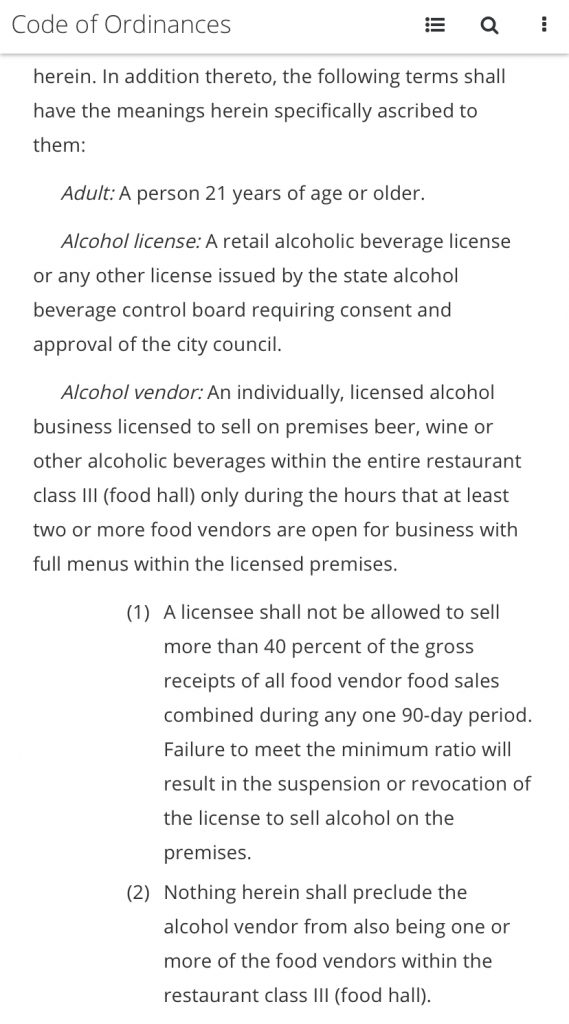CULLMAN, Ala. – The Cullman City Council on Monday, June 28 passed a revision to Section 4-33 of the Cullman City Code of Ordinances allowing alcohol to be sold and purchased on Sundays from 10 a.m. until 10 p.m. This amendment to the ordinance comes just over a decade after the public vote first permitted the sale of alcohol within Cullman city limits in over a century.
“Cullman’s history with alcohol made quite an impact on the growing generations within,” shared Cullman County Museum Director Drew Green. “Cullman was originally wet. John Cullmann, our founder, was from Frankweiler, Germany where they are famous for wine. Cullman used to export wine and there was a cellar with over 3,000 kegs. There were more saloons than churches here until Prohibition came. Once that ended, Cullman did go wet again, but we never regained the vineyards and production. That is the period that a lot of people referred to when the vote in 2011 came up and individuals claimed they did not want drunks in the street. When men went to fight in World War II, the women and preachers got together and voted it dry. And we remained dry until 2011.”
Other changes to this ordinance will allow alcohol to be sold from 6 a.m. – 11 p.m. Monday through Thursday, a change from the previous sale time of 8 a.m. – 11 p.m. For those venturing out on the weekends, alcohol sales will last from 6 a.m. – midnight as opposed to the previous 8 a.m. – midnight. Special exceptions will be made for the celebration of New Year’s Eve and New Year’s Day, in which it will be lawful to remain open and serve alcohol until 2 a.m. on New Year’s Day of any year.
Though numerous restaurants across the community have shared their excitement and optimism about what this new day of sales could mean in revenue and foot traffic, a few have expressed concern over what this new day of sales may mean.
When the ordinance was originally crafted 10 years ago, the disallowance of Sunday sales was accompanied by a 60/40 percent rule. This means it is required that a restaurant with an alcohol license not sell more than 40% of the total receipts in alcohol over the course of any 90-day period.
“A licensee shall not be allowed to sell more than 40% of the gross receipts of all food vendor food sales combined during any one 90-day period. Failure to meet the minimum ratio will result in the suspension or revocation of the license to sell alcohol on the premises.” – Section 4-33 of the Cullman City Code of Ordinances.
According to Jenny Folsom, Cullman City Council president, this segment of the law was implemented to protect the community from bars and clubs popping up. Folsom stated, “We wrote the ordinances so that we do not have bars. We have restaurants that serve alcohol. The 90-day period allows us to monitor and see consumption.”
If a restaurant fails to meet this minimum ratio, it will result in the suspension or altogether revocation of the license to sell alcohol. While a new day of sales means a definite boost in revenue, preventing sales on Sundays did allow businesses a day to sell strictly food which helped complete their percentages.
City Clerk and Alcohol Review Committee member Wesley Moore said, “I am not aware of it (60/40 rule) being a problem right now, but if it does become one in the future, then I am sure ARC (Alcohol Review Committee) will make a recommendation and we can go from there.”
With Sunday alcohol sales now in the businesses, what could this mean for establishments who struggle to meet the 60/40 minimum?
Stephen Gannon, 412 Public House co-owner, shared that while the restaurant is currently closed on Sundays due to staffing shortages, once they have reopened there will be brunch cocktails available on the menu.
“We will definitely have something. I think people crave the mimosas and bloody marys with brunch. I remember making inquiries about it (Sunday alcohol sales) just a month or two after we opened,” Gannon said. “Your sales do have to be 60% food though, and that caused some other places to go out of business early on. We have worked within the framework of the local statues, and we are able to thankfully maintain good business from both food and drink.”
There have not been any revisions made to the 60/40 rule since it was written, largely because it has worked well serving its intended purpose, which was to prevent standalone bars or nightclubs from opening in the city limits of Cullman, according to Folsom.
Moore explained that due to the rule working well for so long, The Alcohol Review Committee currently has no plans to revise the second regulation listed in Section 4-33 of the Cullman City Code of Ordinances.
While some have done well regarding the ordinance, Dreher’s co-owner Christine Chamblee stated, “While we are incredibly grateful to now have Sunday alcohol sales and the opportunity to gain an extra day that not only benefits the success of the restaurant, but the staff monetarily, we have a bigger problem that we are facing and that is the restraint of the 60/40 ordinance in Cullman.”
Chamblee continued, “Our business model has been carried by the success of our bar; that is what people come see us for. Businesses like ours, in Birmingham for example, are wildly successful with a minimal menu and offer a place for people to relax, unwind and have a good time. We love offering that to people in Cullman without having to drive to other cities.”
Besides the smaller city setting, Chamblee said, “Nationwide staffing issue in kitchens has affected us drastically and with the way the ordinance stands now, we absolutely will not survive. We are not asking to allow restaurants to not offer food entirely, but to give us the opportunity to focus on what we do best.”
Chamblee said Dreyer’s, among along bar/restaurant models, are scraping by in the kitchen, having to shorten daily hours, which is resulting is a direct lose-income employees. The lack of staffing is leading to minimal staffs being overworked.
In 2020, there were $13.4 billion spent in tourism. According to the 2020 Alabama Tourism Industry Economic Impact Report, this represents a decrease of 20% as compared to 2019 spending. Restaurant sales do contribute to those figures and those near interstate exits are excited about the revision of Sunday alcohol sales as well.
Buenavista Manager Elsa Hernandez said, “Since we are close to the interstate, we have a lot of customers that do ask if we sell alcohol on Sundays. I think it will be a great idea. People that are not from Cullman ask, and the majority of the ones that come here want to eat here and if we do not have alcohol, they just go somewhere else. I think it will be great.”
Folsom also shared, “We have a quarterly check-in and if it’s starting to slip and there are not enough food sales, the business will be notified, and we will be watching them more closely the next quarter. We want them to succeed and to my recollection, there has only been one establishment that was unable to meet that, and I believe they went out of business before we had to take any action.”
When asked about the possibility of revising the 60/40 rule in Section 4-33 of the Cullman City Code of Ordinances, Folsom stated, “Until we get a large movement for that, when we do, we would take a look at that again.”

Copyright 2021 Humble Roots, LLC. All Rights Reserved.


























